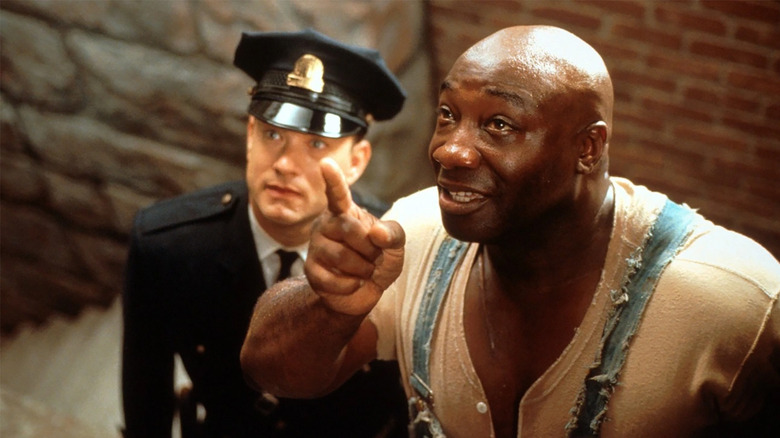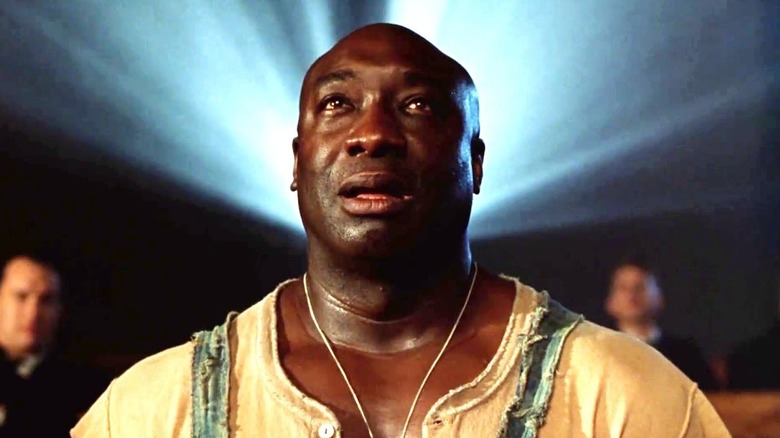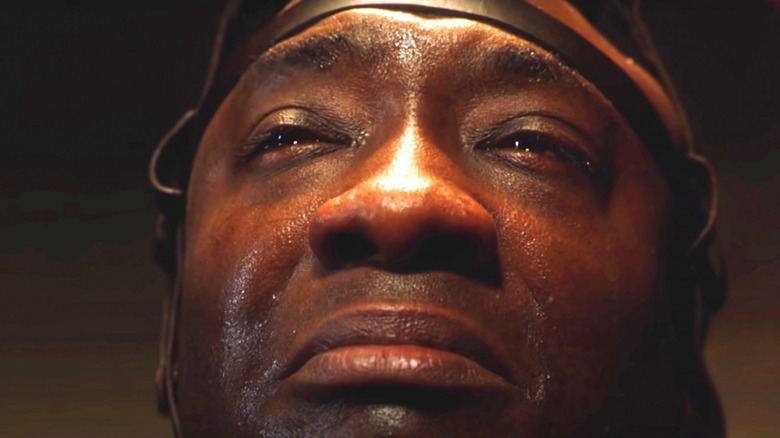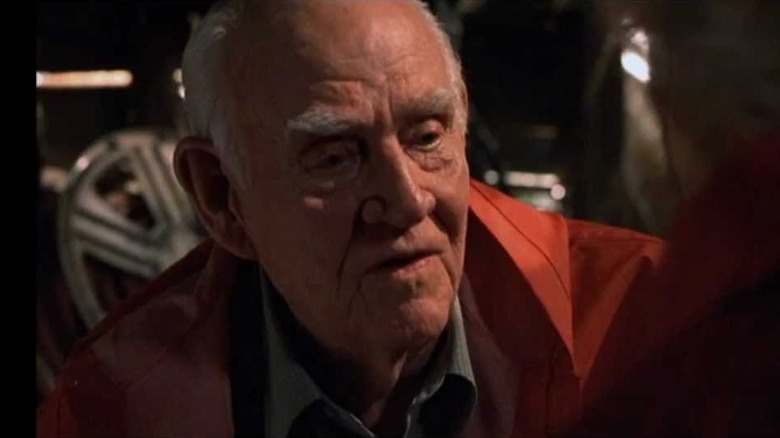The Green Mile Ending Explained: The Curse Of A Healing Touch
The works of Stephen King have been adapted for film and television over 60 times, with many becoming undeniable cinematic classics. Written and directed by Frank Darabont, and based on Stephen King's 1996 novel of the same name, "The Green Mile" starred Tom Hanks as a death row prison guard during the Great Depression named Paul Edgecomb who experiences supernatural events after the inscrutable John Coffey (Michael Clarke Duncan) shows up at his prison. The film was a massive critical success, earned four Academy Award nominations, and until the "IT" films from Andrés Muschietti came along, "The Green Mile" was the highest-grossing adaptation of any King adaptation.
When John Coffey first arrives, his large stature strikes fear in the hearts of his fellow inmates and the guards alike, but the supernatural events that follow him are not quite as destructive as what is seen in typical King superhumans. Coffey has the power to bring things back from the dead if he is able to do so in a timely manner shortly following their death. He can also take away sickness from a person, but he needs to either take on the disease himself or transfer it to another person. Many have read the character as a Christ-figure, one who is unfairly punished despite being put on Earth to save others. Despite the connection Coffey makes with Edgecomb, the ending of the film is open to a bleak interpretation.
The Injustice of John Coffey and Black Men Like Him
Standing taller than the jail cell door that housed him, John Coffey is used as a scapegoat for the horrific crime of the raping and murdering of two small white girls. Set in 1935 in the South, "The Green Mile" exists in a world 20 years before the wrongful lynching of 14-year-old Emmett Till, who was murdered for allegedly whistling at a white woman (via History.com).
We know almost immediately upon meeting Coffey that there's no way this gentle giant is capable of the atrocious crimes he's been accused of, but during this time in American history, and unfortunately still today, Black men are presumed guilty even if proven to be innocent. King wrote "The Green Mile" in 1996, and while there's never been any confirmation that King was inspired by another horrific story of injustice, there are some parallels that can be drawn between the story of John Coffey and the execution of George Stinney Jr.
In 1944, at only 14-years-old, George Stinney Jr. was tried, convicted, and executed in the same year for the alleged murder and possible sexual assault of two young girls (via The Washington Post). His "confession" was believed to have been coerced (which should have made it inadmissible in a court of law), his Sixth Amendment rights had been violated, and yet an all-white jury sentenced him to death. Stinney Jr. remains the youngest American with an exact birth date confirmed to be sentenced to death and executed in the 20th century. A South Carolina circuit court judge voided his guilty verdict in 2014, a kind gesture, but one that cannot bring back the life of a wrongfully convicted Black child. Stinney Jr. never stood a chance in the racist American judicial system, and neither did John Coffey.
"I Tried To Take It Back, But It Was Too Late"
When John Coffey is found with the bodies of the two young girls, he is seen uncontrollably sobbing, and embracing their lifeless corpses. It looks as if he is trying to offer them comfort, but to the all-white group that finds him, he looks like a guilty man. "I tried to take it back," he tells the Sheriff, "But it was too late." It's clear that the men, desperately looking for answers and someone to blame, take Coffey's words to mean that he's confessed to their murder. In actuality, after witnessing Coffey's incredible gifts ourselves, that his words were in reference to his inability to bring the girls back to life. The guilt and grief he is expressing is not because he caused their deaths, but because he wasn't able to resurrect them.
Coffey is polite, cordial, and deeply empathetic, frequently taking on the afflictions of others to absolve them of pain and suffering. He cures Edgecomb's bladder infection, the cancer-stricken wife of Warden Hal Moores, and when asked about these miraculous abilities, he simply says that he "took it back." Taking it back ...exactly what he tried to do for the murdered children, but he was unfortunately unable to do so. It was too beyond the realm of possibility for a group of white men to believe that this Black man had been trying to save their lives, and Coffey was instead immediately painted as a monster.
Penance Through Salvation
Despite all of the overwhelming evidence that John Coffey did not commit the crime he was accused of, he is still executed by electric chair. He's fearful, but has accepted his fate and welcomes death, seeing the world as a cruel place and tired of feeling constant pain from the way people cause harm to one another. Coffey requests that they not place the hood over his head during his execution as he is afraid of the dark, echoing one of his very first requests to Officer Edgecomb, that he leave the light on in his cell after bedtime. The officers all watch with great remorse as he passes, many seeming to know deep down that they've all bore witness to the execution of an innocent man.
Coffey knows his light will live on in other ways, but we aren't told how the light will manifest. Officer Edgecomb, Mr. Jingles the mouse, and Melinda Moores (Patricia Clarkson) are all able to live healthy, happy lives because of Coffey's healing touch, while Wild Bill Wharton (Sam Rockwell) and Officer Percy Wetmore suffer terrible yet earned fates for their deplorable behaviors. It feels as if karmic justice has been enacted, but it's not a net-positive for those involved.
Officer Edgecomb tells the story of "The Green Mile" to his companion Elaine, from his current perspective as a 108-year-old man living in an assisted living facility. Elaine views Edgecomb's long life as one of John's miracles, but Edgecomb knows the truth. He knew of John's innocence but didn't fight for his survival. He allowed an innocent man capable of miraculous works to die, and now, his penance is to live on earth without the sweet release of death, and he must watch as everyone he loves dies around him. That includes Elaine, whose funeral Edgecomb is later seen attending while he wonders how much longer he will be alive. Coffey was freed of the pains of the earth in death, a burden Edgecomb has been tasked to carry for an eternity.



